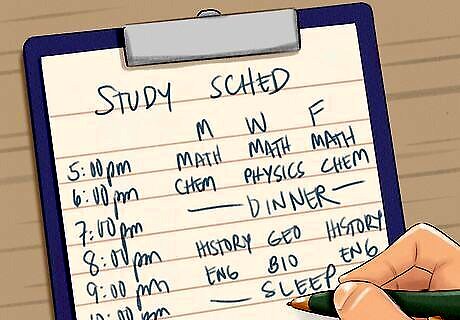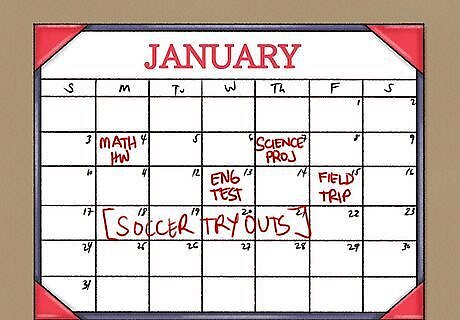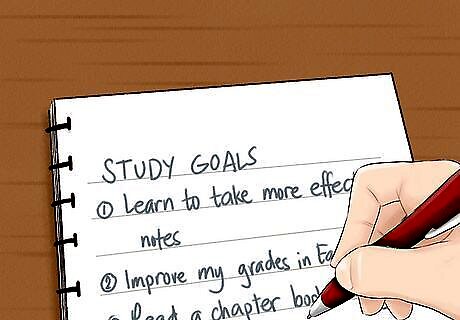
views
Making the Perfect Study Space

Pick a spot away from the television or any other kind of screens. Eliminate all the distractions you can, starting with the TV and/or screens. Turn the screens off when study time begins and make this a consistent rule. It’s loud and colorful, and there’s no way your child can study well in front of it. Help your child find a place to work in a room without a TV. For younger kids who might still need lots of help from parents, try the kitchen or dining room table. Older children might prefer to study alone at a desk in their room, so resist their requests to put a TV in their bedroom.

Set up rules for everyone’s cell phones. During study time, everyone in the house should put their phones on silent and limit their screen time. Modeling this behavior for younger children is especially important, as they’ll feel like they’re part of a team effort. If you have older and younger children in the same house, ask older children to put their phones on silent and not check them when in front of younger, studying siblings.

Accept the computer as a necessary distraction. Because so much homework is online now, you won’t be able to avoid the distraction of the computer. Either sit with your child or check in with them frequently to make sure they’re not on social media or browsing the Internet when they should be studying. You can also set up software to limit Internet distraction. For Macs, Self-Control is a free service that blocks a list of websites during study times. For Windows, go with Cold Turkey for a fee of $20 per month. There’s also StayFocused for Chrome browsers or LeechBlock for Firefox.

Provide plenty of light. Having a well-lit space will keep your child awake and focused and prevent them from straining their eyes. Make sure there are bright overhead lights or several lamps in your study space. A window is also a good idea, but keep on eye your child in case it becomes a distraction.

Do your own work in the space with your child. If you’re watching TV while your child is studying, that’s only going to make them jealous and distracted. Teach them by example. Sit down next to your child and work on something while they study. Finish your work, write a grocery list, or pay bills in their study space while they’re working. This will keep them from feeling alone. For example, if your child is studying at the kitchen table, sit down next to them and work on a task of your own. Seeing you focused on your tasks is also a great way to model good behavior for your child.
Getting Organized

Set a study schedule to create a routine. Pick a few hours each day that can be dedicated to studying and doing homework. Stick to this time as best you can, as keeping to a routine will help your child learn to set aside time for these tasks on their own as they get older. If the study schedule can’t be the same from day to day, keep it constant from week to week. This way, your weekly routine is stable and recognizable for your child. Break study time up into a few blocks of 1-2 hours if necessary. One block can occur right after school, and then another right after dinner.

Collect your child’s weekly or monthly lesson plans. Especially when your child is younger, they’ll need your help to stay on top of assignments. Ask your child’s teachers for lists of their weekly homework, as well as updates on bigger, months-long projects. These lists may be online. If so, print them out and post them somewhere both you and your child see them every day. By middle and high school, teachers usually give syllabi that cover half or even the whole year. If your older child still needs guidance, ask them if they’d be willing to share those syllabi so you can help them keep track of due dates.

Help your child make a calendar to keep track of assignments. Buy a big desk calendar at a school supplies store or online. Sit down with your child’s lists of assignments and syllabi and fill in all the big due dates for assignments, tests, school breaks, and extracurricular events. Filling in exciting things like winter break and the school play is as important as writing down the big science project. It’ll give your child something to be excited about when they check their calendar. Once they can write well, have your child be the one to do the writing. This will help them memorize dates as well as feel like the calendar is really theirs.

Teach your child how to use a planner for daily and weekly tasks. You should also buy a planner to help your child make daily and weekly to-do lists. This can include smaller, short-term assignments as well as the bigger ones. You can also use the planner to help your child remember to do daily or weekly chores. Teach them to get excited about checking things off their to-do list. You can give them stickers and markers to make writing in their planner more fun and personal.

Teach your child to make flashcards to do well on quizzes and tests. Especially for learning formulas in math and science and memorizing vocabulary in language classes, flashcards can be the perfect study tool. Break out the index cards and markers. Show your child that they can use flashcards to quiz themselves or a friend. When your child is younger, you can create flashcards with them and quiz them with the flashcards. As they get older, you can encourage your child to be more independent by coaching them as they make the flashcards and helping them find ways to study with the flashcards on their own.

Encourage your child to take good notes while studying. When they’re reading, tell your child to take notes or highlight the text. This will help them really engage with the material. Sit with them the first few times they take notes or highlight. Be sure they know not to take notes on or highlight everything they read. Emphasize key terms, big dates, and important definitions. Show your child different ways of organizing their notes. For example, they could keep one sheet for terms and definitions, another for listing dates, and one more for jotting down answers to big-picture questions like “what’s the major theme of this story?” or “what’s the global significance of the American Revolution?”
Developing a Good Mindset

Help your child ask questions and think critically. Make sure your child isn’t just memorizing information. Instead, work with them to make them think deeply about their assignments, as this will allow them to really understand what they’re learning. You can ask questions like: “Why do you think your teacher would assign this type of project? What do you think you’ll learn from it?” When your child gets a correct answer, ask them to explain how they came up with it.

Make specific study goals. At the beginning of the school year, sit with your child and write down three to five goals related to their schoolwork and study habits. Halfway through and again at the end of the year, look at your list and check your progress. Your child’s goals can be related to their study habits, or to doing well on a particular assignment. These goals can be things like: “Learn to take more effective notes,” “Improve my grades in Earth Science” or “Read a chapter book on my own.”

Set your child up with a study buddy. Talk to your child to find out if they have a friend they’d enjoy studying with, or check with your child’s teacher or a librarian at the local library to find a study buddy for your child. You and the friend’s parents can take turns hosting a weekly study session for your kids. Encourage your child and their friend to help each other out with each of their strongest subjects. One might be “in charge” of math, and the other of reading. Having a study buddy is a great way to get your child in the habit of quizzing themselves or other people to commit information to their memory. Make sure the sessions don’t turn into social hours by checking in frequently. You can do so sneakily by bringing over snacks or having the study sessions in a common area of your home.

Avoid letting your child panic over school. Make sure your child stays positive about their schoolwork. Even if they’re struggling with a class, remind them that all they can do is try their best, and that you’re here to help. Even if your child is panicking because they’ve totally forgotten they need to make a volcano display by 6am the next morning, don’t add to the crisis by getting angry. You should both take deep breaths and tackle the situation calmly.

Focus on your child’s efforts instead of grades. While you want your child to strive for the best grades they can get, you also don’t want to make them anxious or achievement-obsessed. Tell your child that you want them to try their best, and that the grades are secondary. This will help them learn to study for the knowledge rather than the A.



















Comments
0 comment